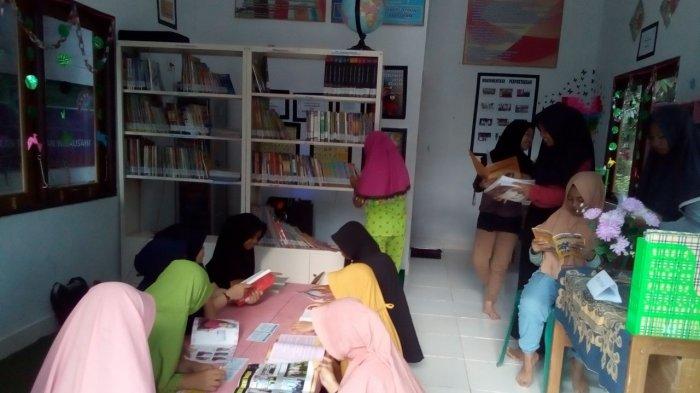Various efforts have been made to improve the quality of Indonesian society through reading habits. Information literacy movements are also carried out in rural areas. The library also plays its essential role in this activity. Many components involved to improve information literacy, but the results have not been optimal. The news in Kompasiana online states that Indonesia has more than 250,000 libraries in the archipelago, unfortunately only 10% of them are running well, some libraries even did not work well and eventually were closed. Meanwhile in East Java, data obtained from Libraries and Archives Agency states that East Java has 3,135 village libraries from a total of 8,501 villages. Village libraries are also trying to adapt to the times, where information and communication technology is developing rapidly. One of the missions of the village library is to improve community literacy in order to empower higher quality communities. When every part of society has information literacy skills, there will be many benefits they can get in life. Moreover, literacy skills are also needed in work environments. The most important thing in information literacy skills is lifelong learning, therefore literacy skills must be possessed by the community, from the upper class to the lower class community.
A research was conducted in 3 village libraries in Jombang Regency, in the villages of Tondowulan, Karanglo and Podoroto. These libraries are managed by the Public Library of Jombang Regency. Jombang is one of the cities in East Java with large rural areas and has achieved great achievements thanks to its hard work in increasing awareness of information literacy in its community. Measurement of public information literacy is based on 6 indicators according to UNESCO (2008), the definition and articulation of information needs. When individuals have a definition and articulation of the information, they will know what information they need, so mistakes in the process of seeking information can be minimized. Furthermore, the ability to search for information and access the required information is useful for speeding up the search process. Accessing information is one of the strategies used to find information, both from digital and printed sources, searching for it individually or asking for help from others.
Furthermore, the ability to assess the information found, whether the information is related with the information or not. The assessment is also carried out to find out the truth of the previous information they used previously. This is important because true or false information is combined into one. Whenever individual makes an initial assessment, they can get a probability rate of the true or false information. Next, the individual’s ability to organize the information acquired. This ability has a big role in terms of a well-organized information, therefore the process of retrieving information becomes easier and faster. Organizing information includes the process of storing information so storage becomes an important thing to strive for until labeling the information. Then the ability to use the information acquired. This ability is one of the important things because the acquired information is more than one and often we find information more than we need. This ability can help us in choosing the information, whether we use all of it, or just a little of the information. The last ability is to communicate with the acquired information to others, ethically and legally, so that it does not cause problems. The information will not become personal property, but also shared with others. The advancement of information and communication technology makes the process easier and faster, so the society can gain access to the information faster, to determine whether it is good or bad information.
The results of the research showed that as a whole, village communities in Jombang defined and articulated their needs for information, knew the location and how to access the information, assessed the information found, organized the information found, used existing information, found, stored, communicated and used information ethically. It means that the village community already has a high level of literacy. The village library plays a role in improving information literacy in rural communities by providing a forum for various positive activities such as basic life skills training, computer workshops, and so on. The research also showed that as a whole, rural communities in Jombang have used technology in their daily lives in seeking information to solve problems both in terms of work, school and other affairs. Only the elderly do not use technology, while other age groups are accustomed to using technology.
Librarians and village library staff should know how community information literacy affects users’ needs. If the village library has found out about it, the library can improve the quality of its service to the community. That’s how a library can be called a user-oriented library. Furthermore, increasing the competence and capacity of librarians is indispensable. Thus, good library services in line with the conditions of the community will be realized.
Author: Endang Fitriyah Mannan
The full article can be accessed at https://digitalcommons.unl.edu/libphilprac/3542/
Mannan, Endang Fitriyah Mrs, “The Role of Village Libraries to Improve Information Literacy in Rural Communities” (2019). Library Philosophy and Practice (e-journal). 3542.





